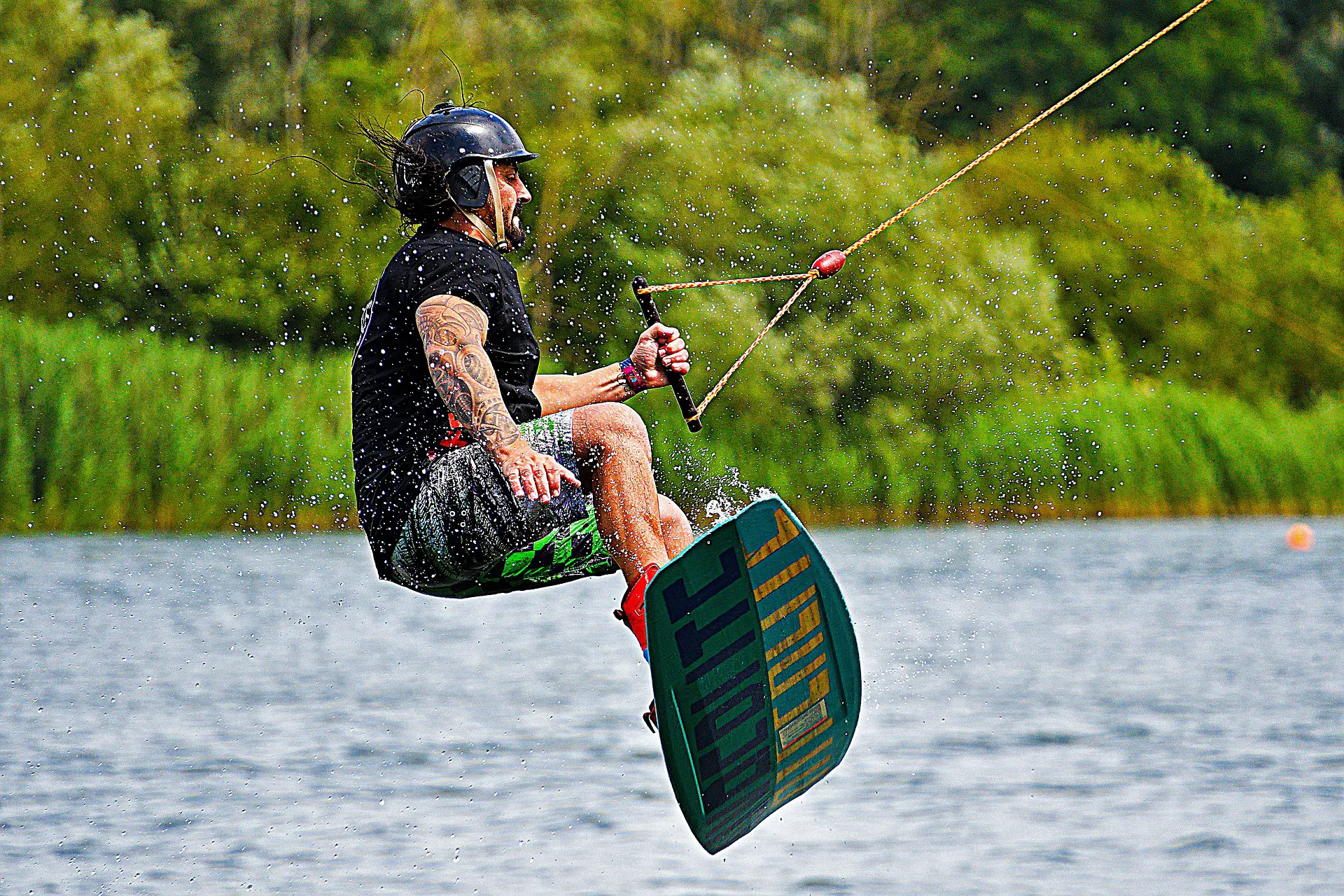At first, water skiing may daunting; the key is to start with the basics. In this guide, I will explain how to water ski for beginners.
If you haven’t already, read our list covering the Best Water Skis on the market.
EQUIPMENT
TOW ROPE
Verify that the rope is designed for waterskiing. The rope should have a maximum length of 23m. When picking one make sure there’s just a little stretch, so you won’t experience whiplash in situations like turns.
PFD
Pick the right Personal Flotation Device (PFD) or lifejacket. It helps to keep you safe and buoyant when learning to water ski. The PFT should fit closely around the skier’s chest, back, and stomach. Select the right size and buoyancy for your body weight.
SKIS
Make sure to pick skis that have enough surface area for the size/weight of the person. A good option is a combination ski. This has a closed foothold for inserting feet and another foothold on one ski for mono-skiing.
You should also consider the shape of the water ski’s bottom. When picking skis for beginners make sure, the skis are wider and more stable to get the best results.
ON-SHORE PRACTICE
One of the best ways to learn water skiing basics is by practicing on dry land like a sandy beach. Get used to the water-skiing position. Hold the water ski rope’s handle and bend your knees until you’re sitting on the skis. This mimics the position while in the water.
You can also ask someone to pull the rope until they’ve pulled you up into a position that resembles sitting in a chair. Keep your arms straight. This is the position you’ll use when water skiing so make sure to practice until you get it right.
Similar: How to Get Up on a Water Ski.
BOAT DRIVER
The driver should operate the boat at a steady speed and only accelerate/decelerate after receiving a signal from the skier. Make sure to follow guidelines based on the size, weight, and skill of the water-skier.
The speed must be tweaked up/down when the skier turns. The driver should generally speed up on the inside of a turn and slow down the outside of a turn. Here are some speed guidelines based on the water-skier’s weight:
| WEIGHT | SPEED |
| Under 23kg | 113 mph (21 km/h) |
| 25-45kg | 16 mph (26 km/h) |
| 46-68kg | 18 mph (29 km/h) |
| 69-82kg | 21 mph (34 km/h) |
| Over 82kg | 24 mph (38 km/h) |
Make sure the driver turns off the engine fully before you climb back aboard the boat or they return to you when you’ve fallen. This will help to prevent accidents.
Avoid bringing a skier too close to, or obstacles and anyone in the water like swimmers, snorkelers, or other water-skiers. The drivers should also use hand signals to communicate with the skier.
HAND SIGNALS
Speaking of hand signals, it’s important to learn them so you can communicate effectively with the driver. Here are some of the must-know hand signals and their meanings:
| SIGNAL | MEANING |
| THUMBS-UP | You want to go faster |
| THUMBS-DOWN | You want to go slower |
| OK SIGN | Speed/Direction are good |
| WAVE/POINT DIRECTION | You want the driver the turn |
| SLASH AROUND NECK | Driver/Skier wants to stop immediately |
| CLASPING MOTION ABOVE HEAD (lift ski out of water/hold arm straight above head) | You’ve fallen, but you’re uninjured |
| PAT HEAD | You want to return to boat/beach |
TIPS FOR BEGINNER WATER SKIERS
STAND UP SLOWLY
When the rope begins to pull, avoid standing up too quickly. When the rope pulls stand up slowly, keep shoulders level, and the rope between the skis.
LOOK UP
Keep your eyes on the horizon instead of down on your skis.
STAND UPRIGHT
Like roller-skating, you should lean too far back or forwards to avoid falling
BALANCE BODY WEIGHT
Don’t turn/lean and put the same amount of weight on each foot.
DROP ROPE IF YOU LOSE BALANCE
Don’t hold on. Don’t worry – the life jacket will keep you afloat.
LEARN TO CARVE
After you master skiing straight start carving left/right.
Learn to ski on one foot: Lift one ski out of the water after you feel comfortable skiing on a pair of skis. After you practice skiing on one foot, you can move on to mon-skiing. This gives you the ability to do fast carves.
When mono-skiing one foot is behind the other. There’s one foot in the binding, and the back foot is put in a loop.
Change grip
When you start to monoski change grip on the rope handle. Turn the handle, so it’s vertical and put one hand on each side.
Water skiing for beginners is a LOT of fun. Don’t panic and remember, the worst that will happen is you end up getting wet while having fun! Thanks for reading our guide covering how to water ski for beginners.

